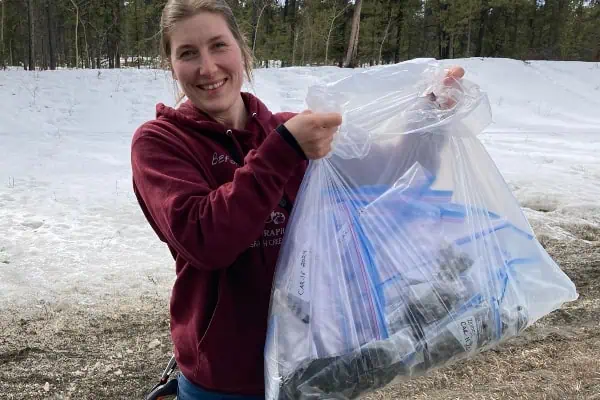Fritz Mandl was enjoying a sunny day at Army Beach in September when he came across what looked like a dying butterfly. The fragile insect was flying past him on a cold gust of northern wind when it suddenly dropped from the air and went limp, becoming motionless. Assuming that the poor creature had died, perhaps because it had stayed north of sixty for too long, Fritz picked it up and brought it back to Whitehorse with a mind for giving it a proper burial.
He left the butterfly on his windowsill, when to his surprise four days later he saw it flying around in the sunlit window. It had come back to life. Amazed by this apparent miracle Fritz wanted to see how long it would survive. He experimented with different foods, first trying honey and then realizing that it likes fruits better, especially apples.
He figures that he must be doing something right because five months later the butterfly is still alive and well. It flutters around his home, especially on sunny days when the light shining through his windows creates more warmth. Sometimes he says it will hibernate for a few days and wake up again when the sun comes out, its body changing size depending on how much it eats.
Fritz asked around, did some research and came to the conclusion that it’s a mourning cloak butterfly. Mourning cloaks winter in the north where they hibernate and are among the first to be seen in the spring. As one of the most common butterflies in Yukon territory they are remarkably early risers, often surprising residents as well as tourists by coming out on snowy days as early in the year as March.
Found in both Eurasia and North America, the scientific name for the mourning cloak is nymphalis antiopa. It’s called the Camberwell beauty in Britain. The North American name derives from the brown cloaks worn by women in mourning. The undeveloped form of this species of butterfly is called the spiny elm caterpillar.
Fritz is hoping that his new roommate will last the winter so that he can set it free in a flowery meadow this spring where it will have a chance to mate before passing on. Although Mandl seems to have interrupted the butterfly’s hibernation he believes that it would likely have died in the exposed situation where he found it.
As it stands he’s glad for the company and likes keeping tabs on the butterfly’s progress. Based on his own research he thinks it’s likely to live until the spring, when it will be able to complete its natural cycle. Fritz says that he has always cared about animals and used to adopt abandoned birds. Fritz Mandl is the owner of Sharpening Service, located at 6149 6th avenue. His shop offers a variety of sharpening services including skates, knives, and mechanical parts.




